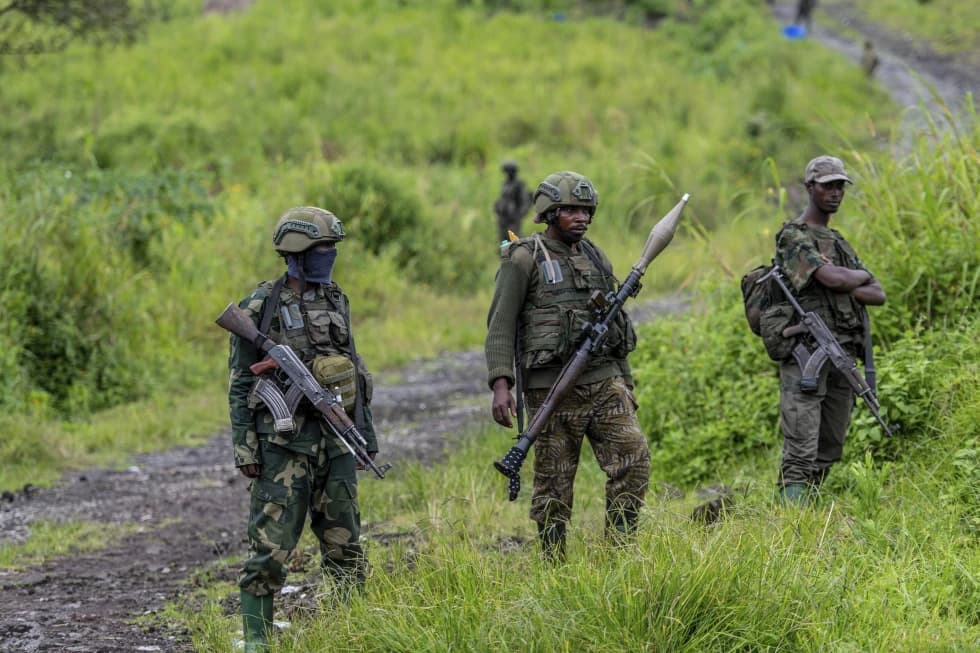YAOUNDÉ, Cameroon – A leading bishop in the Democratic Republic of Congo (DRC) says the situation in the conflict-hit eastern part of the country is “catastrophic.”
Monsignor Donatien Nshole, the Secretary General of the Bishops’ Conference of the DRC, was speaking shortly after meeting with the country’s Minister of Justice and Keeper of the Seal, Constant Mutamba, on Jan. 21.
There has been intense fighting in recent months between the Rwanda-backed M23 rebels and government forces in the mineral-rich eastern region of the DRC, with over 200,000 people being forced from their homes. Rwanda has been accused by the UN of having 4,000 soldiers fighting alongside the M23 in the DRC. However, there are 120 armed groups fighting in the east of the country.
“We are aware of the situation in the east,” Nshole said at the end of the meeting with Mutamba.
“The security situation, the humanitarian situation is catastrophic,” he said.
“Personally, I was on a mission a few years ago before the situation got worse. We saw first-hand the reality of our soldiers. It’s not just the soldiers; let’s think of all the displaced people, all the families, all the people living in the forest, all the victims, and the orphaned children. So they need peace, they need prayer. This would be an opportunity to intensify the prayers we are already making for peace,” the priest said.
On Thursday, panic gripped the town of Goma in North Kivu Province following reports that Rwanda-backed M23 rebels had occupied the city of Sake, located just 16 miles from Goma.
Radio Okapi – established by the United Nations – cites Leopold Mwisa, one of the thousands of people who fled the town of Sake to seek refuge in Goma, as saying that as he escaped, he saw families scattered and running in all directions.
“There are people scattered all over the Sake-Goma road, not knowing which way to go. It was really a sorry sight,” he said.
“We don’t really understand how people can continue to suffer to this extent and that serious measures or decisions are not being taken to put an end to this situation, it’s really, really, really worrying,” he added.
“It’s a complicated situation,” said Elie Mbulegheti, the Director of Communications of Caritas Butembo-Beni, in comments to Crux.
He said the fighting has triggered “mass displacement, led to widespread famine, and serious rights abuses.”
“Obtaining essential services such as healthcare, education, housing, and protection for vulnerable populations has become increasingly challenging,” he told Crux.
As the situation worsens, hospitals in the region are getting saturated, according to the International Red Cross and Red Crescent Movement.
According to the Goma bureau chief of the Red Cross, Myriam Favier, over 215 wounded people have been admitted to ICRC-supported CBCA Ndosho hospital in Goma in January so far.
Human rights abuses
On January 19, Amnesty International issued a damning report on the violations of international humanitarian law both by the Congolese Armed Forces and the M23 rebels.
The report accuses both sides of using “explosive weapons with wide area effects into densely populated areas more than 150 times. These attacks, which killed more than 100 civilians and wounded hundreds, violated international humanitarian law and likely constitute war crimes.”
Agnès Callamard, Secretary General of Amnesty International, said that the devastating escalation in the use of explosive weapons is “a new and dangerous development in a three-decade conflict already rife with human rights and humanitarian law violations.”
Fighting in recent months in the mineral-rich eastern DRC has forced at least 200,000 people from their homes.
The war in eastern Democratic Republic of Congo (DRC) is one of the world’s most complex and prolonged conflicts. It began in the aftermath of the Rwandan genocide in 1994, when millions of refugees, including many ethnic Tutsis, fled to the DRC. This influx exacerbated existing ethnic tensions and led to a series of violent conflicts.
It has led to the deaths of more than six million people since 1996, and displaced more than six million others, according to the United Nations.
Several failed diplomatic efforts have been made to bring the conflict to an end. The latest talks were due on 15 December, but differences between the leaders of the DRC and Rwanda led the talks to be called off.
Both the government and the Church now seem to be in agreement: The solution may be found in prayer, and that explains why both Church and State have agreed to organize a day of prayer on February 9, 2025.
“We are not praying to win the war. We are praying for peace, for peace to be established, and peace means the end of war. Peace means people converting, because for there to be war, people have to take up arms. I think that’s where we really need to understand things,” said Nshole.













